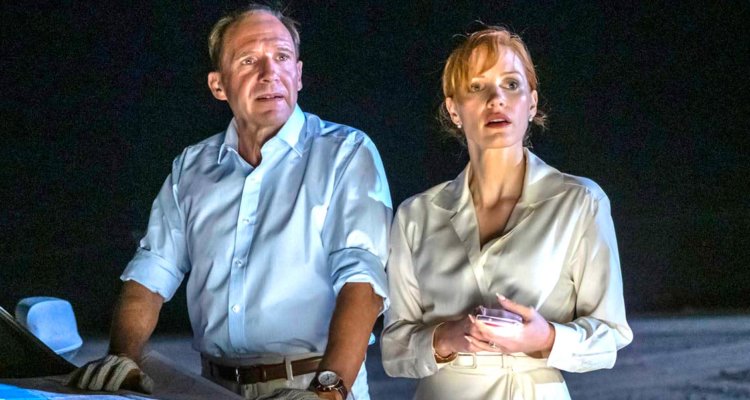“Should you still be drinking?” she asks, and it’s pointed, but everything they say to each other is pointed. Jo Henninger (Jessica Chastain) and her husband David (Ralph Fiennes) have been married for something like a dozen years, and it’s not going well; they guard each other with barely-veiled (if that) contempt, and their interactions are less like conversations than jousts, a constant barrage of little jabs and snipes. The trip to Morocco may have been an attempt to repair that marriage, or it may have just been something to do while it failed. But it certainly doesn’t go as planned.
READ MORE: Toronto Film Fest 2021 Preview: 16 Must-See Movies To Watch
That trip is the subject of “The Forgiven,” the latest from writer/director John Michael McDonagh – his fourth feature effort, following “The Guard,” “Calvary,” and “War on Everyone.” He’s a tough filmmaker to get your arms around; his films are divergent beasts, freely intermingling comedy and drama and pathos in varying measures. “Calvary” is a mostly serious meditation on faith, while ‘War’ is a nihilistic riff on the buddy action-comedy, but all are informed by a bristling intelligence and keen ear for character-driven dialogue. That goes for “The Forgiven” as well – until it doesn’t.
READ MORE: Fall 2021 Movie Preview: 60+ Must-See Films
We meet the Henningers in an already stressful situation: they’ve been invited to a weekend getaway at the home of their old friend Richard (Matt Smith) and his partner Dally (Caleb Landry Jones), and it’s an ornate, castle-like abode hours into the desert. It’s night and David has been drinking and they’re arguing, and then Driss (Omar Ghazaoui), a local boy, steps out in front of the car, and that’s that. They show up at Richard and Dally’s with cracks in the car and a body in the backseat; Jo is in a state of shock, and David is concerned about the consequences but steadfast that it was an accident. Richard assures them that it will all be fine: “I know the officer in charge, it will be a formality.”
In these early scenes, McDonagh establishes and works his primary visual and thematic motif, familiar to just about anyone who’s taken a vacation in an “exotic” locale: the contrast of great wealth in close proximity to great poverty. David and Richard discuss this lost life as an inconvenience, a buzzkill for their weekend of drunken abandon, as Richard’s servants look on, listening, bristling. Even before these troublesome guests arrive, Richard has established his condescension (“We couldn’t have done it without our little Moroccan friends,” he tells the other guests). They do their very best to carry on as if nothing of any real import has occurred, a contrast most strikingly dramatized later in the story, as Driss’s father Abdellah (Ismael Kanater), removes his son’s body from the estate and fireworks crack overhead.
READ MORE: ‘All My Puny Sorrows’: A Familiar But Well-Acted Indie Family Trauma Drama [TIFF Review]
Abdellah’s appearance at the gates of the estate prompts the action of the film’s second half, as the grieving father insists that David should accompany him back to their village and help bury his son. “It is the custom,” he is told, and told forcefully enough to understand that it’s not really a choice. He will go, and will likely have to pay the family off (“I know when I’m being robbed,” he sneers), and he will be expected to say he’s sorry. “Are you sorry?” Jo asks.
“I’ll say I’m sorry,” he replies.
So McDonagh creates an effective narrative counterpoint, intercutting Jo back at the weekend bacchanal (where she seems to rather enjoy the distance and the freedom to flirt and party) and David on his journey, which becomes both physical and intellectual. Through his interactions with Abdellah, who keeps revealing more about himself and his motivations, and with Abdellah’s right-hand man Anouar — Saïd Taghmaoui, one of the most valuable utility players in the business — he comes to understand the weight and the consequences of his actions.
You see the unavoidable problem with a story like this. There have, if we’re being honest, been quite enough stories that sacrifice the disadvantaged so that the privileged can learn a little lesson about themselves. McDonagh is such a smart writer that one spends much of the movie waiting for his script to exhibit some awareness of the trope, and to comment on it, but that acknowledgment never arrives – and as a result, this is his thinnest screenplay to date, flimsy enough that, in a lesser actor’s hands, it could really fall apart.
So McDonagh should count himself lucky for landing Fiennes, who invests what could’ve been a one-note character with genuine complexity and depth. He has, over the years, proven himself quite adept at playing this particular kind of asshole – bitter, smart (but not as smart as he thinks he is), witty (ditto), boozy, and more than a little broken (Chastain has less to do, but she does it with vigor.) Fiennes makes the spiritual journey play and finds exactly the right, rueful note for what should be his closing scenes. Alas, McDonagh keeps going, dragging the conclusion unnecessarily to tie up loose ends, and then lands on a perhaps provocative, perhaps poetic, but mostly unsuccessful conclusion that lands with a thud. It’s a shame, because “The Promise” boasts some of Fiennes’ best work to date, and that’s no small compliment. [C+]
Follow along with our full coverage from the 2021 Toronto International Film Festival here.

